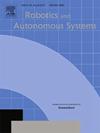Online learning for agile underwater maneuvering: Gaussian processes and sparse regression for data-driven model predictive control
IF 5.2
2区 计算机科学
Q1 AUTOMATION & CONTROL SYSTEMS
引用次数: 0
Abstract
Autonomous underwater vehicles (AUVs) show much promise in environmental sensing, aquaculture, and security applications. Robust and adaptive control strategies can immensely benefit these scenarios by increasing autonomy and endurance. However, AUVs are nonlinear systems whose dynamics are challenging to model, especially during agile maneuvers at high angles of attack. To better capture these nonlinear effects, this paper proposes a physics-informed system identification scheme that combines prior knowledge of the system dynamics with data-driven regression. Strategies including Sparse Identification of Nonlinear Dynamics (SINDy), nonlinear least squares regression, and Gaussian processes (GPs) are used to learn the AUV dynamics online from measured data. These data-driven models are then implemented in an adaptive model predictive controller (MPC) for agile maneuvering that drives the system to a set point while updating the prediction model when new measurements are available. The performance of these three system identification strategies is evaluated on two different 6-DOF AUV platforms. All three strategies show good real-time performance, while the GP model offers the best balance between accuracy, speed and robustness. Field experimental data from the SAM AUV and the MOLA AUV are used for performance evaluation.
敏捷水下机动的在线学习:数据驱动模型预测控制的高斯过程和稀疏回归
自主水下航行器(auv)在环境传感、水产养殖和安全领域的应用前景广阔。鲁棒和自适应控制策略可以通过增加自主性和耐久性来极大地受益于这些场景。然而,水下航行器是非线性系统,其动力学建模具有挑战性,特别是在大攻角的敏捷机动过程中。为了更好地捕捉这些非线性效应,本文提出了一种物理信息系统识别方案,该方案将系统动力学的先验知识与数据驱动的回归相结合。利用非线性动力学稀疏识别(SINDy)、非线性最小二乘回归和高斯过程(GPs)等策略从实测数据中在线学习水下航行器的动力学特性。这些数据驱动的模型随后在自适应模型预测控制器(MPC)中实现,用于灵活机动,该控制器在获得新测量值时更新预测模型,并将系统驱动到一个设定点。在两种不同的六自由度水下机器人平台上对这三种系统识别策略的性能进行了评估。三种策略均表现出良好的实时性,而GP模型在准确性、速度和鲁棒性之间取得了最好的平衡。利用SAM AUV和MOLA AUV的现场实验数据进行了性能评估。
本文章由计算机程序翻译,如有差异,请以英文原文为准。
求助全文
约1分钟内获得全文
求助全文
来源期刊

Robotics and Autonomous Systems
工程技术-机器人学
CiteScore
9.00
自引率
7.00%
发文量
164
审稿时长
4.5 months
期刊介绍:
Robotics and Autonomous Systems will carry articles describing fundamental developments in the field of robotics, with special emphasis on autonomous systems. An important goal of this journal is to extend the state of the art in both symbolic and sensory based robot control and learning in the context of autonomous systems.
Robotics and Autonomous Systems will carry articles on the theoretical, computational and experimental aspects of autonomous systems, or modules of such systems.
 求助内容:
求助内容: 应助结果提醒方式:
应助结果提醒方式:


